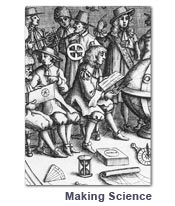Date/Time
Friday, February 6, 2009–Saturday, February 7, 2009
All Day
Location
UCLA William Andrews Clark Memorial Library
2520 Cimarron Street
—a conference organized by Mary Terrall, University of California, Los Angeles, and Deborah Harkness, University of Southern California
co-sponsored by the Dibner History of Science Program at the
Huntington Library and the USC-Huntington Early Modern Studies Institute

In 2007 the Huntington Library acquired the Burndy Library, a significant collection of books and manuscripts in the history of science. This acquisition adds to a wealth of resources for the history of science in the Los Angeles area. To celebrate the history of science—past, present, and future—in Los Angeles, the William Andrews Clark Memorial Library of UCLA and the Henry E. Huntington Library (with the support of the USC-Huntington Early Modern Studies Institute) will be convening two conferences in 2009. This is the first of these conferences; the second will take place at the Huntington Library on May 8–9, 2009. The broad theme of the conferences, Making Science: Inspiration and Reputation, 1400–1800, has been deliberately designed to be as inclusive and wide-ranging as possible. Speakers will address such questions as: What inspired scientific ideas and practices in the early modern period? How did texts, communities, practices, and experiences inspire creative and innovative thinking about the natural world? How did images work to make knowledge and reputations? How was scientific reputation established? What role did the reputation of various kinds of practitioners play in constructing the image of “science”? How did early modern scientific biographies and autobiographies, systems of credit and patronage, and university and court affiliations help to shape attitudes towards both science and scientists?
Program
Session 1: Making Images and Image-Making
Chair: Mary Terrall, University of California, Los Angeles
Sachiko Kusukawa, Trinity College, Cambridge
“Picture Perfect? Pictorial Strategies in Sixteenth-Century Natural History”
Adelheid Voskuhl, Harvard University
“Android Automata between Artisanal and Philosophical-Theological Cultures in the European Enlightenment, 1720–1780”
Daniela Bleichmar, University of Southern California
“Image, Word, Thing: Transporting Imperial Nature in the Spanish Enlightenment”
Session 2: Experience and the Construction of Expertise
Chair: Jan Golinski, Dibner Fellow, Huntington Library
Ken Alder, Northwestern University
“Reading Characters: Expert and Self in Early Modern France”
Pamela Smith, Columbia University
“Making Objects, Knowing Nature: Techniques and the Knowledge of Nature in the Early Modern Era”
Session 3: The Complications of Gender
Chair: Robert Frank, University of California, Los Angeles
Mary Fissell, Johns Hopkins University
“Gendering Enlightenment: Sarah Stone, William Cadogan, and the Politics of Maternity”
Alix Cooper, State University of New York, Stony Brook
“Naming Names: Bibliography as History in the Early Modern Study of Nature”
Robert Goulding, University of Notre Dame
“Good Will Hunting: Peter Ramus’ Posthumous Influence on the Teaching of Mathematics”

